72nd Outreach Programme of IIRS-ISRO on “Basics of Geocomputation and Geoweb Services”
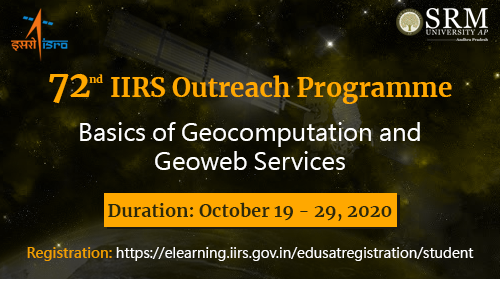 Indian Institute of Remote Sensing (IIRS) -Indian Space Research Organization (ISRO) presents 72nd outreach programme titled “Basics of Geocomputation and Geoweb Services”, which can be availed by the students of SRM University-AP, Andhra Pradesh.
Indian Institute of Remote Sensing (IIRS) -Indian Space Research Organization (ISRO) presents 72nd outreach programme titled “Basics of Geocomputation and Geoweb Services”, which can be availed by the students of SRM University-AP, Andhra Pradesh.
Geocomputation is an emerging field that uses computational techniques such as neural networks, heuristic search, and cellular automata, for spatial data analysis. It is evolving as an essential scientific realm that encompasses techniques of geographical information systems, neurocomputing, heuristic search and cellular automata.
Students of SRM AP are recommended to participate in this immensely beneficial programme from October 19, 2020 till October 29, 2020. During the programme, attendees will be introduced to Geocomputation – technology and applications, online GIS and geo-web services, open geodata repositories, and ISRO geoweb services for thematic applications, programming concepts for geo-computation, introduction to Python and R, and much more.
Programme Schedule: Please Click Here
Registration Link: Please Click Here
For further details, Visit Here
- Published in Departmental Events, ECE Events, Events
Faculty Development Programme (FDP) on “Recent Advancements in Machine Learning and Artificial Intelligence”
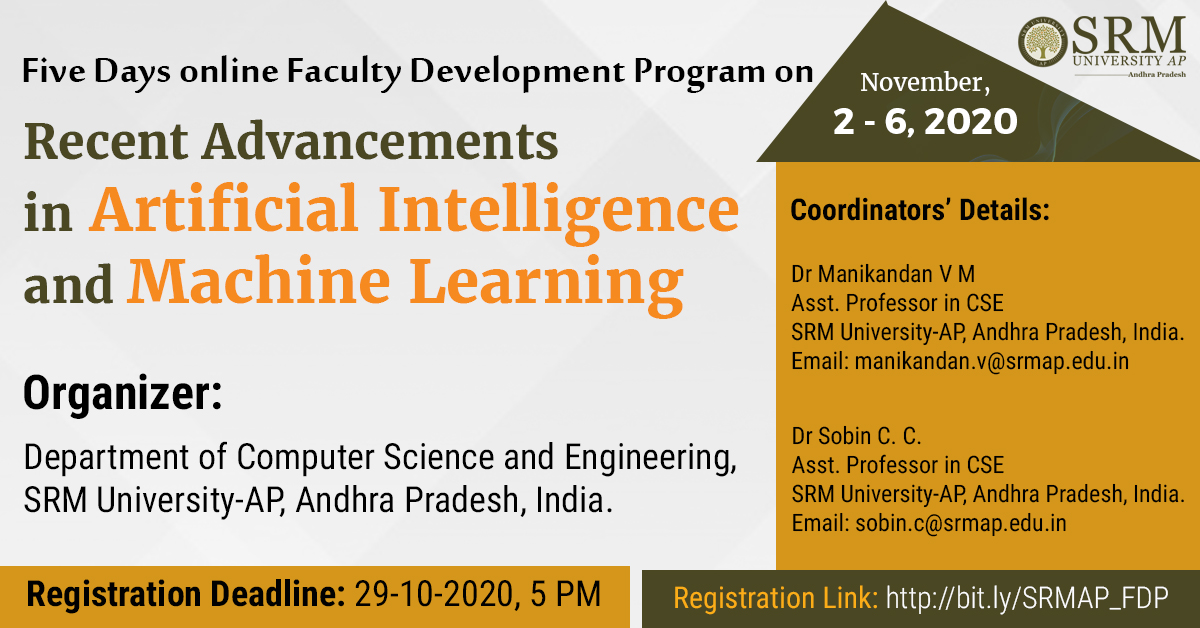 Department of Computer Science and Engineering, SRM University-AP, Andhra Pradesh is orchestrating a five-day online Faculty Development Programme (FDP) on “Recent Advancements in Machine Learning and Artificial Intelligence” from November 2, 2020, till November 6, 2020. The programme will be split into two sessions, where the first session will be held from 9.30 AM to 11 AM, and the second session will commence at 11.30 AM and end at 1 PM. During the FDP, Resource persons will be sharing knowledge during the morning sessions of the FDP to inspire, and mentor the faculty. Among the venerated speakers, Prof Dipti Prasad Mukharjee, Professor, Electronics and Communication Sciences Unit, ISI Kolkata, India will be delivering a lecture on “Machine Learning Techniques for Computer Vision”. Further, Dr V Masilamani, Associate Professor, Computer Engineering, Indian Institute of Information Technology Design and Manufacturing (IIITDM) Kancheepuram, Tamil Nadu, India, will be sharing insights on “Machine Learning for Image Quality Assessment”.
Department of Computer Science and Engineering, SRM University-AP, Andhra Pradesh is orchestrating a five-day online Faculty Development Programme (FDP) on “Recent Advancements in Machine Learning and Artificial Intelligence” from November 2, 2020, till November 6, 2020. The programme will be split into two sessions, where the first session will be held from 9.30 AM to 11 AM, and the second session will commence at 11.30 AM and end at 1 PM. During the FDP, Resource persons will be sharing knowledge during the morning sessions of the FDP to inspire, and mentor the faculty. Among the venerated speakers, Prof Dipti Prasad Mukharjee, Professor, Electronics and Communication Sciences Unit, ISI Kolkata, India will be delivering a lecture on “Machine Learning Techniques for Computer Vision”. Further, Dr V Masilamani, Associate Professor, Computer Engineering, Indian Institute of Information Technology Design and Manufacturing (IIITDM) Kancheepuram, Tamil Nadu, India, will be sharing insights on “Machine Learning for Image Quality Assessment”.
Moving ahead with the FDP, Dr Deepak Mishra, Associate Professor & Head, Avionics Department Indian Institute of Space Technology (IIST), Trivandrum, Kerala, India, will host a session on “Machine Learning Applications in Remote Sensing”. Another session will be held on “Object and Image Memorability Analysis using Deep Learning Approach” by Dr Arjit Sur, Associate Professor, Computer Science and Engineering, IIT Guwahati, India. In addition, Dr A Vadivel, Associate Professor, Computer Science and Engineering, SRM University-AP, Andhra Pradesh, has been requested to conduct a session on “India Facial Expression Classification Using Machine Learning”. Apart from this, Dr Amal Dev P, Assistant Professor, Computer Science and Engineering, IIT Guwahati, India will be discussing the “Applications of AI in Computer Graphics”.
Dr Deepak Ranjan Nayak, Assistant Professor, Computer Engineering, MNIT Jaipur, Rajasthan, India, will be speaking on “Medical Image Processing using Deep Learning” whereas, Dr Sanjay Kumar Panda, Assistant Professor, Computer Science and Engineering, NIT Warangal, Telangana, India have chosen the topic “Case Study of Machine Learning: Recommender Systems” for his lecture during the FDP. Also, the department of CSE will be welcoming Dr Subhankar Mishra, Assistant Professor, Computer Science, National Institute of Science Education and Research (NISER), Bhubaneswar, India, and Dr Jatindra Dash, Assistant Professor, Computer Science and Engineering, SRM University-AP, Andhra Pradesh, India, to deliver a talk on “Secure and Private Machine Learning”, and “Texture Classification using Machine Learning”, respectively. Post graduate and research students, along with faculty across various institutions with background knowledge in Computer Science and/or Electronics Engineering are urged to attend the FDP to augment their horizon of knowledge, and receive an e-certificate on successfully completing the entire five-day FDP.
Registration Link: Please Click Here
Brochure: Please Click Here
Coordinators’ Details:
Dr Manikandan V M
Assistant Professor, Department of Computer Science and Engineering
EMAIL: manikandan.v@srmap.edu.in
Dr Sobin C C
Assistant Professor, Department of Computer Science and Engineering
EMAIL: sobin.c@srmap.edu.in
- Published in CSE EVENTS, Events, Webinars
Department of Computer Science invites Dr Sridharan R to share insights on “Baby steps towards Quantum Computing”
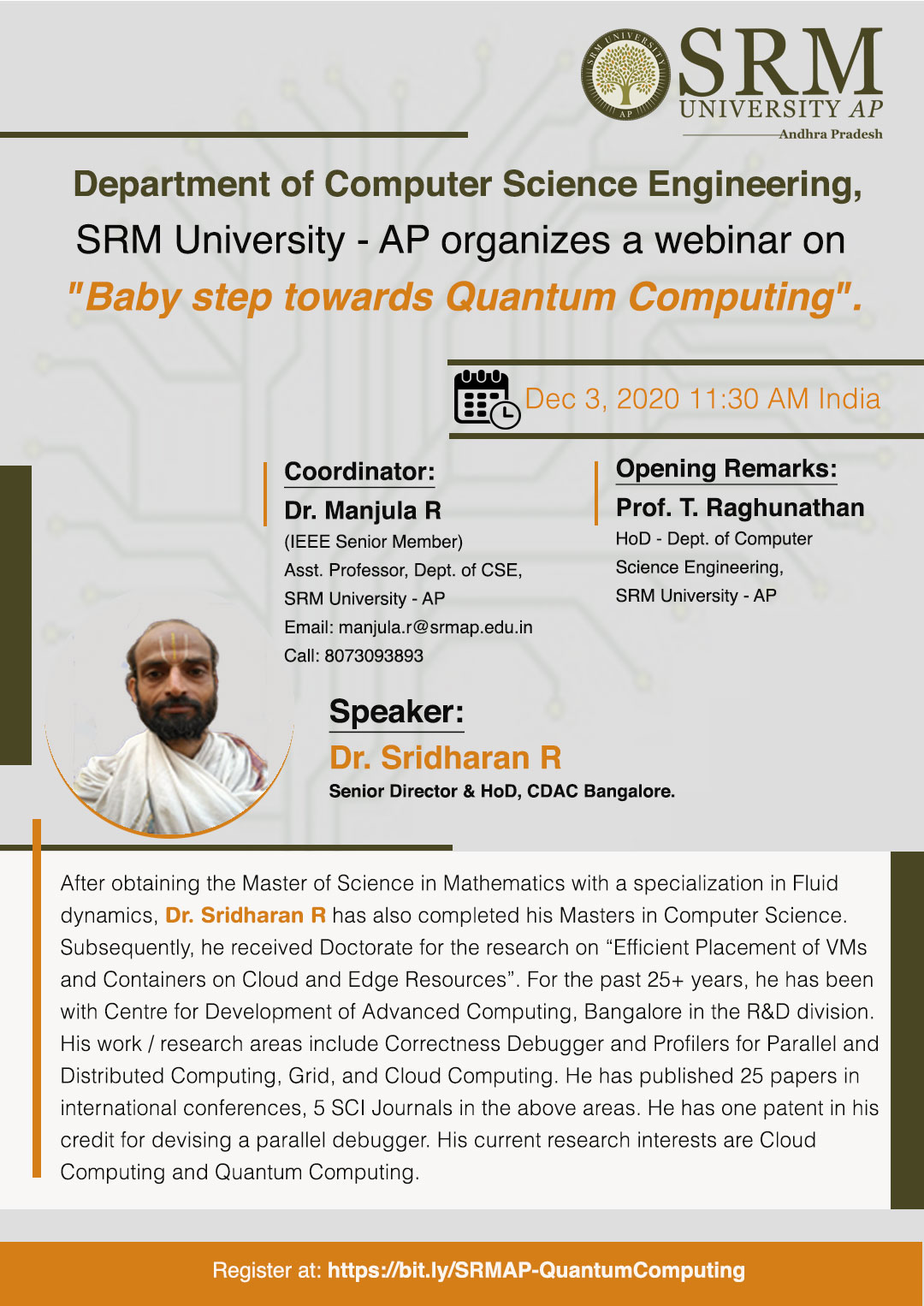 Dr Sridharan R will be hosting a session arranged by the Department of Computer Science, SRM University-AP, Andhra Pradesh on December 3, 2020, at 11.30 AM. During the session, the revered mathematician will be delivering a lecture on “Baby steps towards Quantum Computing”. Dr Sridharan R researched on “Efficient placement of VMs and containers on cloud and edge resources” to obtain his Doctorate in Mathematics. In his career spanning over 25 years, his portfolio of research domains includes correctness Debugger and Profilers for Parallel and Distributed computing, as well as Grid and Cloud computing. Further, his current research interest involves Cloud Computing and Quantum Computing. Quantum computing is the use of quantum phenomena such as superposition and entanglement to perform computation. Capable of moving both backward and forward in time, quantum particles can exist in two places at the same time and even ‘teleport’. This subject has gained immense popularity in the modern days as Quantum computers will have enhanced efficiency by using quantum bits or qubits instead of the simple manipulation of ones and zeros.
Dr Sridharan R will be hosting a session arranged by the Department of Computer Science, SRM University-AP, Andhra Pradesh on December 3, 2020, at 11.30 AM. During the session, the revered mathematician will be delivering a lecture on “Baby steps towards Quantum Computing”. Dr Sridharan R researched on “Efficient placement of VMs and containers on cloud and edge resources” to obtain his Doctorate in Mathematics. In his career spanning over 25 years, his portfolio of research domains includes correctness Debugger and Profilers for Parallel and Distributed computing, as well as Grid and Cloud computing. Further, his current research interest involves Cloud Computing and Quantum Computing. Quantum computing is the use of quantum phenomena such as superposition and entanglement to perform computation. Capable of moving both backward and forward in time, quantum particles can exist in two places at the same time and even ‘teleport’. This subject has gained immense popularity in the modern days as Quantum computers will have enhanced efficiency by using quantum bits or qubits instead of the simple manipulation of ones and zeros.
Registration Link: Please Click Here
- Published in CSE EVENTS, Events, Webinars
Insightful workshop on Blockchain and IOT to challenge your intellect and mettle to solve real-life problems
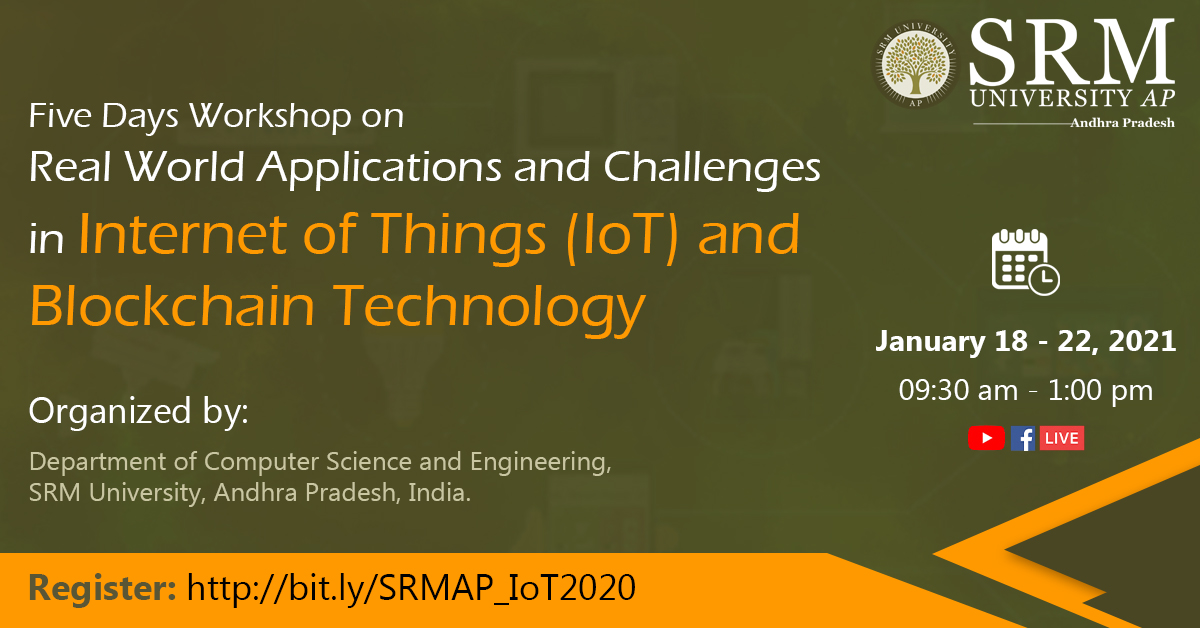 Department of Computer Science and Engineering is conducting a five-day workshop on the real-world applications in the Internet of things and Blockchain Technology from January 18-22, 2021. The workshop has been organised in association with APPLY VOLT. Eminent speakers from reputed institutes such as the University of California, San Diego, USA; IIT Kharagpur, NIT-Warangal, MNIT Jaipur will be sharing their valuable opinions and insights in the workshop. The registration for the workshop ends on January 16, 2021.
Department of Computer Science and Engineering is conducting a five-day workshop on the real-world applications in the Internet of things and Blockchain Technology from January 18-22, 2021. The workshop has been organised in association with APPLY VOLT. Eminent speakers from reputed institutes such as the University of California, San Diego, USA; IIT Kharagpur, NIT-Warangal, MNIT Jaipur will be sharing their valuable opinions and insights in the workshop. The registration for the workshop ends on January 16, 2021.
Internet of Things (IoT) is one of the most exciting trends and innovation in the recent history of technological advancement covering a wide range of applications like healthcare, entertainment, appliances control & utility services, security, defence, traffic management, transportation, home & industrial automation, remote monitoring, smart cities, smart farming, smart grid etc. IoT is the network of physical devices accessed through the Internet. IoT market is likely to experience year-on-year growth, rising to more than 50 billion devices, digitally connected across the globe by 2020, and representing $19 trillion in business opportunities. The graduate and postgraduate engineers have substantial job opportunities because of a wide range of IoT applications. Research scholars have a tremendous opportunity to work in different applications of IoT.
This workshop aims to impart knowledge about the real-time applications of IoT among students and the teaching community. Experts from academia and industry have been invited to deliver lectures about the current and emerging trends in IoT and Blockchain technology. The workshop will focus on theoretical and hands-on experience in IoT and Blockchain Technology to interface the things for different applications using Raspberry Pi/Arduino/Intel Galileo toolkits with devices such as LEDs, sensors, actuators etc. The theoretical session will be conducted in the morning hours and practical sessions in the afternoon. To conclude the workshop, a small project will be given to the students as a task, and the winners will be awarded a certificate of participants.
To register: http://bit.ly/SRMAP_IoT2020
Registration Closes on: January 16, 2021
Schedule of the Workshop: View Complete Schedule of the Workshop
- Published in CSE EVENTS, Departmental Events, Events, Workshop
73rd Outreach Programme of IIRS-ISRO on “Overview of Geo-processing using Python”
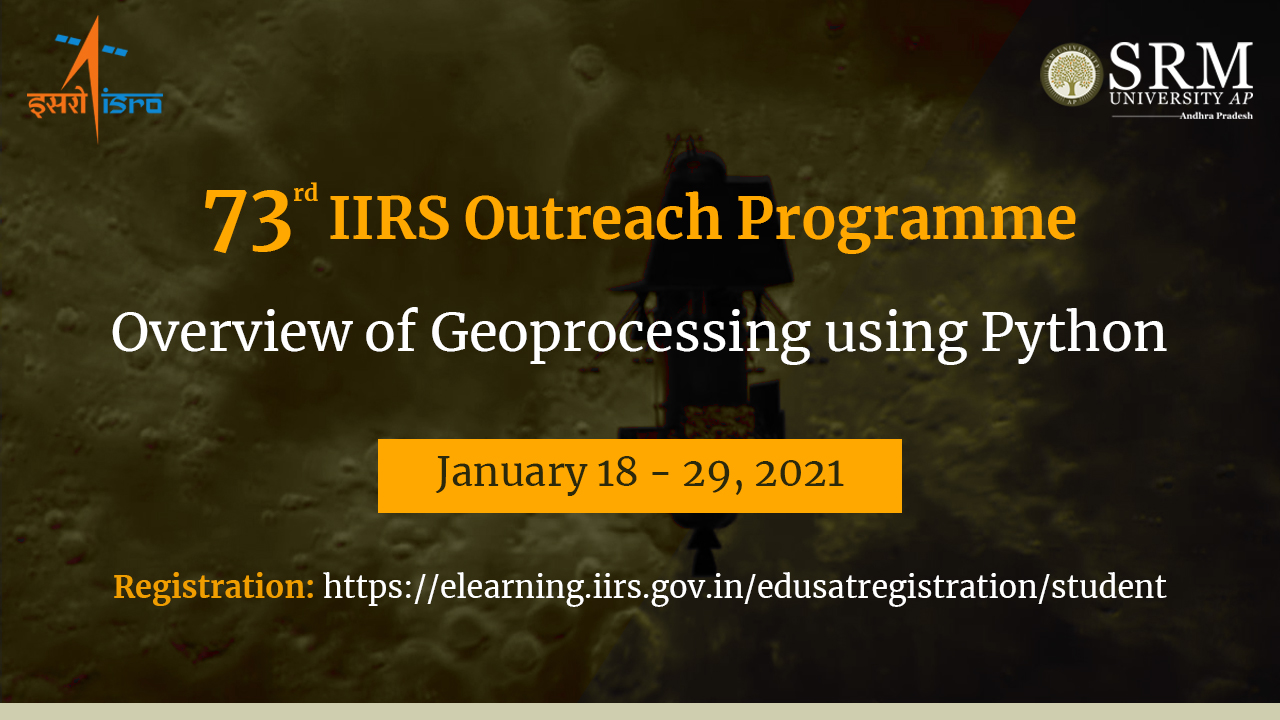 Students of SRM University AP, Andhra Pradesh get the opportunity to attend the 73rd outreach programme titled “Overview of Geo-processing using Python” arranged by Indian Institute of Remote Sensing (IIRS) -Indian Space Research Organization (ISRO). In the modern era, satellite imagery fused with the power of Geographic Information System enhances environmental management system by providing solutions pertaining to issues such as disasters, global climate change, natural resources, wildlife, and land cover. Effectively processing the massive data to decipher useful information is considered the most challenging aspect of geospatial technology. This programme encompassing a session from January 18, 2021 till January 29, 2021 will enable the participants to use Python to visualize geospatial data and derive the desired knowledge, mitigating the aforementioned challenge. Students of SRM AP are encouraged to attend this programme to broaden the prospect of achieving their career aspirations.
Students of SRM University AP, Andhra Pradesh get the opportunity to attend the 73rd outreach programme titled “Overview of Geo-processing using Python” arranged by Indian Institute of Remote Sensing (IIRS) -Indian Space Research Organization (ISRO). In the modern era, satellite imagery fused with the power of Geographic Information System enhances environmental management system by providing solutions pertaining to issues such as disasters, global climate change, natural resources, wildlife, and land cover. Effectively processing the massive data to decipher useful information is considered the most challenging aspect of geospatial technology. This programme encompassing a session from January 18, 2021 till January 29, 2021 will enable the participants to use Python to visualize geospatial data and derive the desired knowledge, mitigating the aforementioned challenge. Students of SRM AP are encouraged to attend this programme to broaden the prospect of achieving their career aspirations.
Programme Schedule: Please Click Here
Registration Link: Please Click Here
For further details, Visit Here
- Published in ECE Events, Events
Dr Malavika Binny to illuminate on the Life and Legacy of Swami Vivekananda
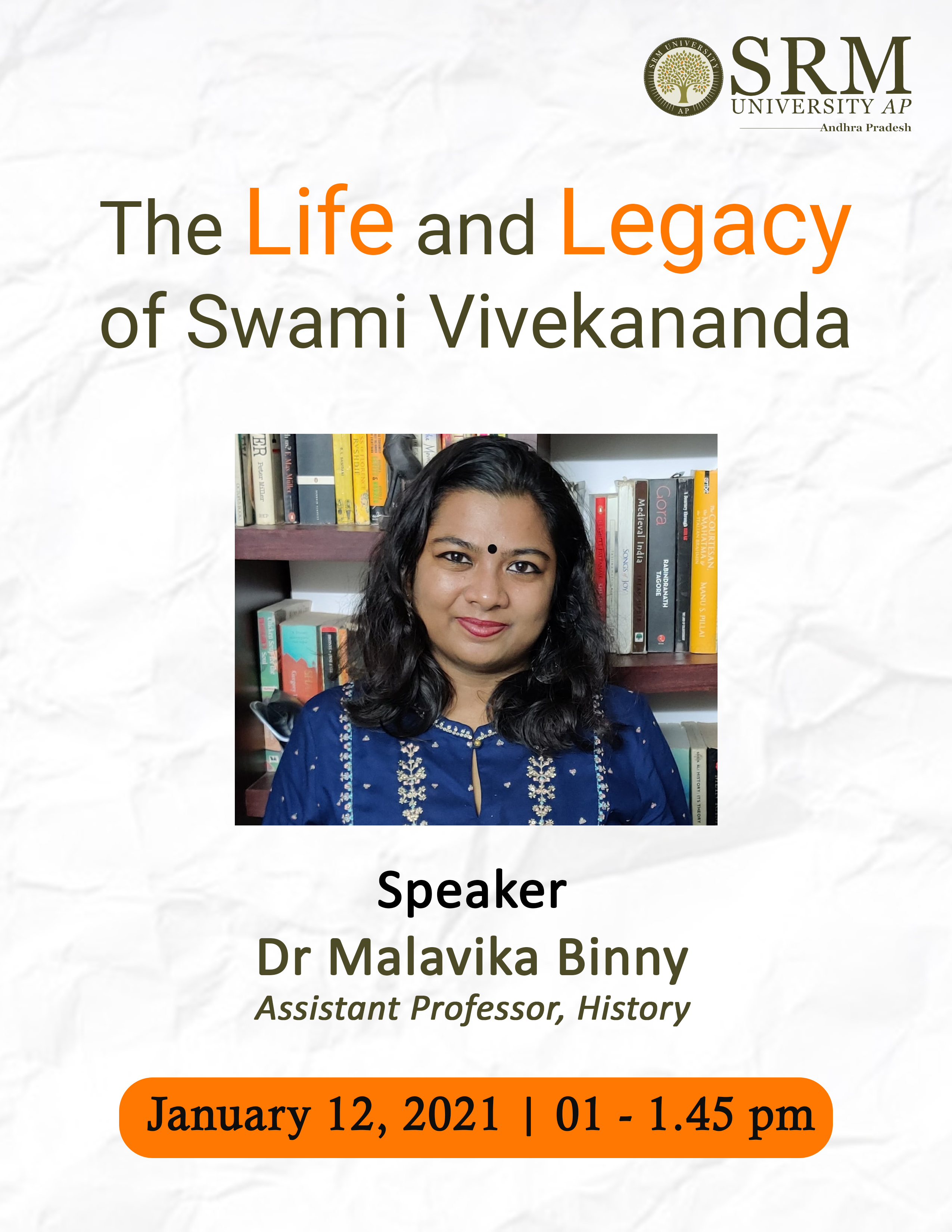
Dr Malavika Binny, Assistant Professor, Department of History, SRM University-AP, Andhra Pradesh will be presenting a webinar on the Life and Legacy of Swami Vivekananda to memorialize the legend on his birth anniversary. Swami Vivekananda worked relentlessly to propagate the ideas of pure life across the globe. His unparalleled greatness surpasses and excels all worldly achievements. He has left us with a rich spiritual legacy pertaining to Hinduism, and salvation of the soul. On January 12, 2021, at 1 PM, Dr Malavika will be providing a depiction of Swami Vivekananda’s life and teachings for the benefit of the audience.
- Published in Events, History Current Happenings, History Events
73rd Outreach Programme of IIRS-ISRO on “Overview of Geo-processing using Python”
 Students of SRM University AP, Andhra Pradesh get the opportunity to attend the 73rd outreach programme titled “Overview of Geo-processing using Python” arranged by Indian Institute of Remote Sensing (IIRS) -Indian Space Research Organization (ISRO). In the modern era, satellite imagery fused with the power of Geographic Information System enhances environmental management system by providing solutions pertaining to issues such as disasters, global climate change, natural resources, wildlife, and land cover. Effectively processing the massive data to decipher useful information is considered the most challenging aspect of geospatial technology. This programme encompassing a session from January 18, 2021 till January 29, 2021 will enable the participants to use Python to visualize geospatial data and derive the desired knowledge, mitigating the aforementioned challenge. Students of SRM AP are encouraged to attend this programme to broaden the prospect of achieving their career aspirations.
Students of SRM University AP, Andhra Pradesh get the opportunity to attend the 73rd outreach programme titled “Overview of Geo-processing using Python” arranged by Indian Institute of Remote Sensing (IIRS) -Indian Space Research Organization (ISRO). In the modern era, satellite imagery fused with the power of Geographic Information System enhances environmental management system by providing solutions pertaining to issues such as disasters, global climate change, natural resources, wildlife, and land cover. Effectively processing the massive data to decipher useful information is considered the most challenging aspect of geospatial technology. This programme encompassing a session from January 18, 2021 till January 29, 2021 will enable the participants to use Python to visualize geospatial data and derive the desired knowledge, mitigating the aforementioned challenge. Students of SRM AP are encouraged to attend this programme to broaden the prospect of achieving their career aspirations.
Programme Schedule: Please Click Here
Registration Link: Please Click Here
For further details, Visit Here
- Published in ECE Events, Events
Panel Discussion on Union Budget 2021-22
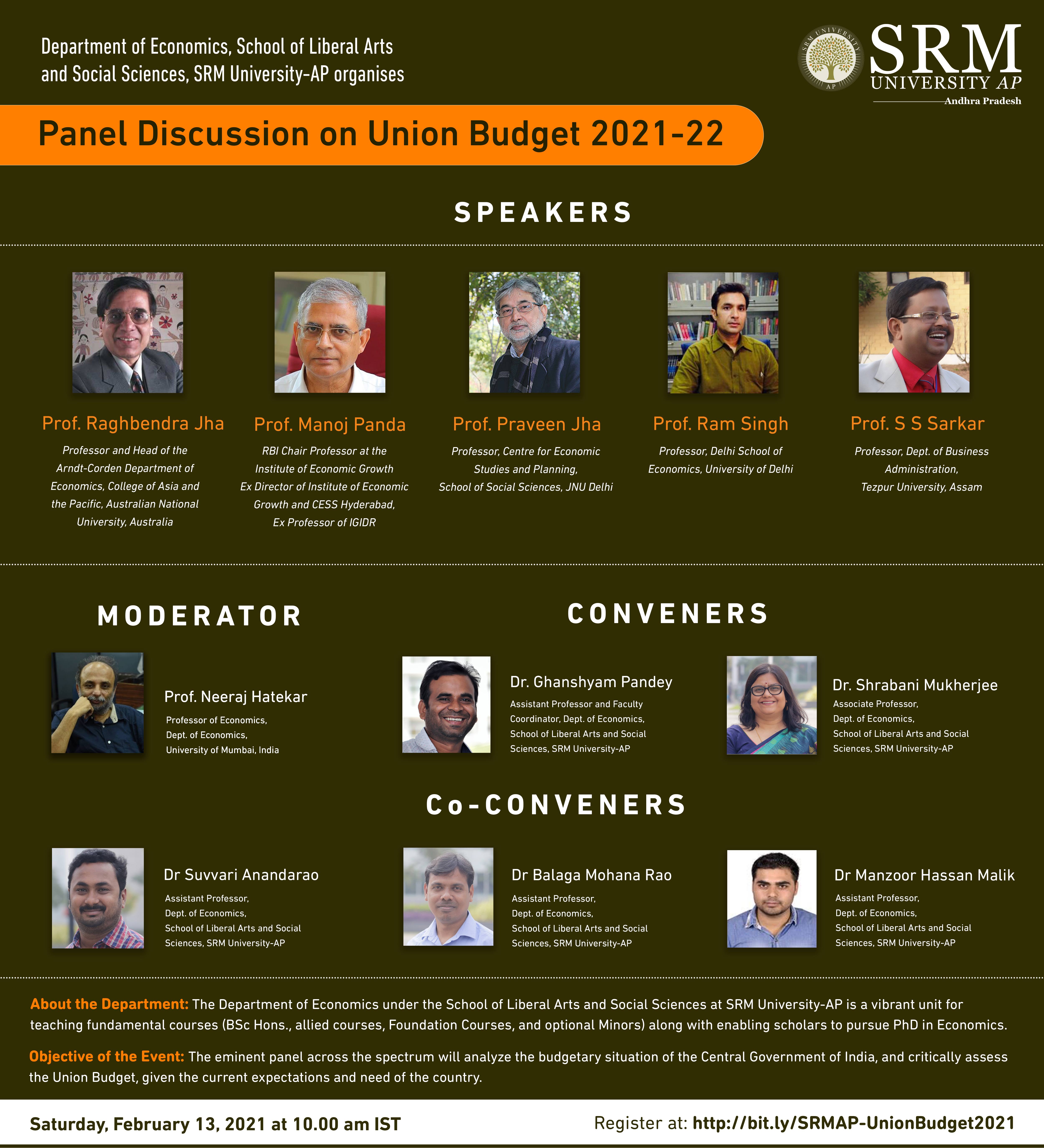 Objective of the Event: The world is facing a severe pandemic driven crisis and India is not an exception. Academics, Industry and the public are eagerly waiting for the revival of the economy. We cannot ignore the role of government. India needs a robust budget which will boost the demand and stabilize the economy. This panel discussion will analyse the announced budgetary sectoral fund allocation and revenue design of GoI. In order to tap the potential revenue sources to cope up with the adverse impact of pandemic, whether budget has been delivered on expected lines. The objective of the event is to place a platform for better understanding about the budgetary situation of the Central Govt. and critical analysis of the Union Budget by the eminent academicians across the spectrum, given the current expectations and need of the country.
Objective of the Event: The world is facing a severe pandemic driven crisis and India is not an exception. Academics, Industry and the public are eagerly waiting for the revival of the economy. We cannot ignore the role of government. India needs a robust budget which will boost the demand and stabilize the economy. This panel discussion will analyse the announced budgetary sectoral fund allocation and revenue design of GoI. In order to tap the potential revenue sources to cope up with the adverse impact of pandemic, whether budget has been delivered on expected lines. The objective of the event is to place a platform for better understanding about the budgetary situation of the Central Govt. and critical analysis of the Union Budget by the eminent academicians across the spectrum, given the current expectations and need of the country.
About the Department: The Department of Economics under the School of Liberal Arts and Social Sciences at SRM University-AP, is a vibrant unit for teaching fundamental courses (core & electives) for B.Sc Hons in Economics along with allied courses for students across other departments. Along with Foundation Courses and optional Minors across other departments, we ensure that the education imparted is justly multidisciplinary so that it helps all the students in rational decision making in the next step in life with proper knowledge. Currently the department offers B.Sc. (Hons.) and PhD in Economics. We have designed an excellent program structure which can cater to the growing market demand for professional economists and policy researchers. These programs in Economics emphasize on the application of economic theories and trained professionals for lifetime learning. This unit is expecting to offer the postgraduate program with specialisation in Econometrics, Finance, Trade and Development in coming years. It is a growing department for research on diverse topics spanning the worlds of theory and practice of economics and interdisciplinary subjects. The vision of the department is to achieve an educational environment committed to excellence, creating employability through skill development, making capacity building for future economists and social scientists. The broader goal is to analyse the socio-economic environment for policy framing with efficient implementation of the policies and designing proper road map for national and sub-national governments. In nutshell, it commits to contribute to welfare generation for the society through creating proper knowledge base and conducting good quality research.
Registration Link: Click Here
- Published in Economics Events, Events
Crack exams with ease: lessons from the maestro
Department of Electronics and Communication Engineering organises Invited Talk to prepare students for the upcoming competitive exams
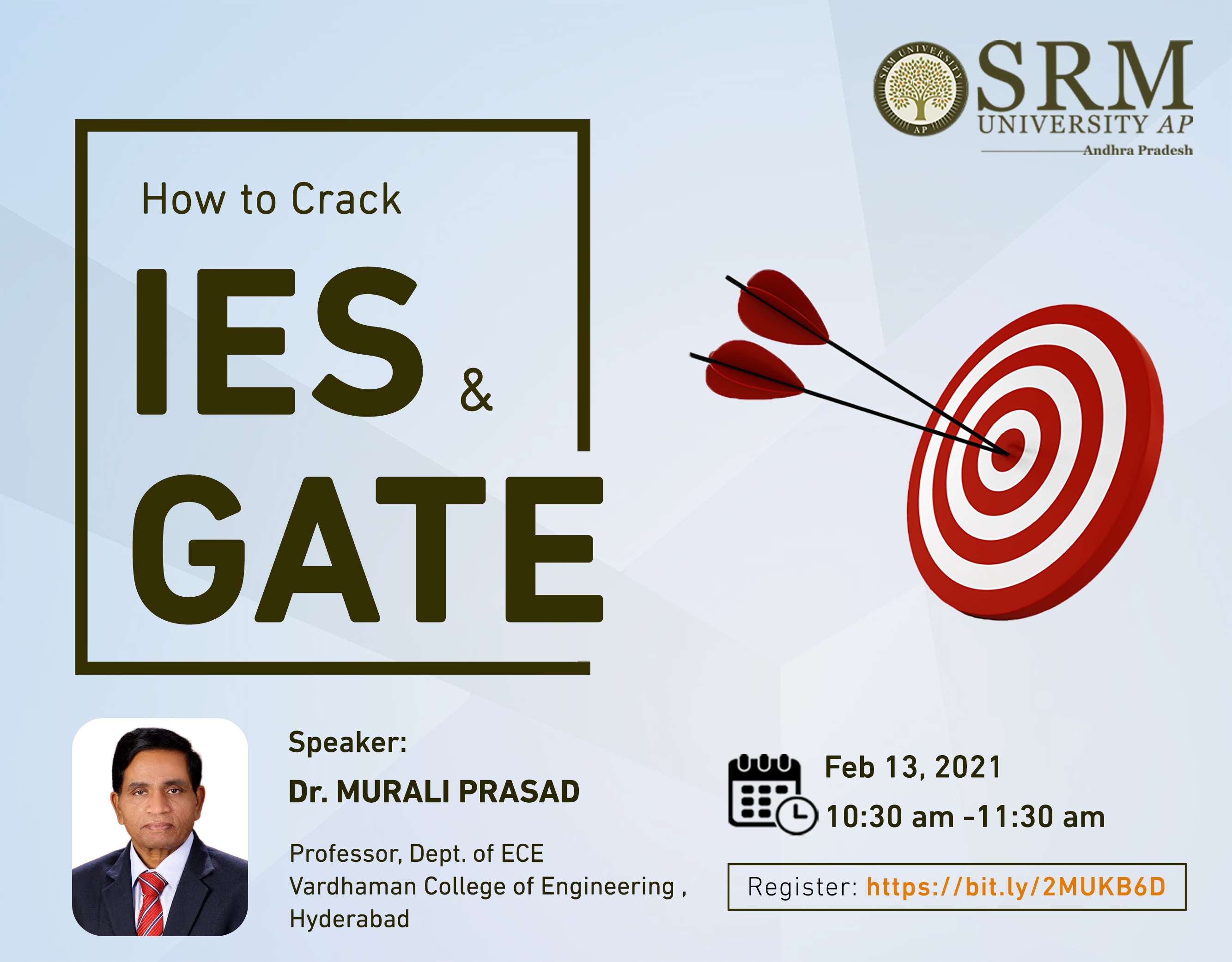 Higher Studies or Job? Students are often torn between these two after the completion of their undergraduate studies. Whereas getting a job after B.E./B.Tech is not that difficult, but securing one’s dream job may not be that easy. Some students prefer to take admission in a reputed institution and pursue higher studies, some might want to join R&D in well-established companies. A few might be even interested in securing employment in the public sector. The choices vary from one student to another depending on their merit, financial stability and personal preferences. SRM University-AP always encourages students to go for their choices. A good pay package is only useful when it comes with a job of one’s inclination. However, first of all, one has to be aware of the choices he/she has. Department of Electronics and Communication Engineering organises an invited talk on the two of the most sought after opportunities for engineers after their undergraduate studies- Indian engineering Services and GATE.
Higher Studies or Job? Students are often torn between these two after the completion of their undergraduate studies. Whereas getting a job after B.E./B.Tech is not that difficult, but securing one’s dream job may not be that easy. Some students prefer to take admission in a reputed institution and pursue higher studies, some might want to join R&D in well-established companies. A few might be even interested in securing employment in the public sector. The choices vary from one student to another depending on their merit, financial stability and personal preferences. SRM University-AP always encourages students to go for their choices. A good pay package is only useful when it comes with a job of one’s inclination. However, first of all, one has to be aware of the choices he/she has. Department of Electronics and Communication Engineering organises an invited talk on the two of the most sought after opportunities for engineers after their undergraduate studies- Indian engineering Services and GATE.
Indian Engineering Service offers highly prestigious employment under the Government of India. The IES is a very specialised and technical service. Only engineering graduates from recognised universities are eligible to take the entrance examination. Even postgraduates with specific specialisations such as wireless communications, radio engineering, electronics, or radiophysics are eligible to apply in certain posts. A career in Indian Engineering Services allows an engineer to administer a large segment of technical challenges in the public sector economy, consisting of Indian Railways, Power, Telecommunications, Central Water engineering, and Defence service of Engineers, Central Engineering Service.
On the other hand, the purpose of the GATE exam is to test students’ knowledge and understanding of their undergraduate level subjects in Engineering and Sciences. A misconception among the students is that the GATE exam is only necessary for the ME. /M. Tech aspirants who want to pursue a career in academia. But, the GATE score of the candidate is also valued by several public sector undertakings (PSU) for recruiting graduate engineers in entry-level positions or to be enlisted in the Fellowship Programs of CSIR or applying for scholarships in ME/M.Tech, and many more.
However, qualifying these examinations is not a piece of cake. It requires rigorous planning, perseverance and above all, hard work. But, there is always some strategic points which can make a student stand out in the exams. Dr Murali Prasad, the distinguished guest of the session, will brief you on some strategic points that will help you immensely in cracking the examinations. Dr Prasad has over 30 years of teaching experience, especially for competitive exams like GATE, IES in ACE Engineering Academy, Hyderabad. He has completed his graduation in engineering from The Institution of Engineers, Calcutta. He pursued his M tech from Pondicherry Engineering College and later obtained his PhD in WiMAX from JNTU Anantapur. Dr Prasad has published six patents and currently working as a Professor at Vardhaman College of Engineering, Hyderabad. Join the session tomorrow at 10.30 am and learn the masterstrokes from the expert to crack competitive exams like GATE and IES.
- Published in Departmental Events, ECE Events, Events, Invited Talks
Dr Josep M. Jornet speaks on the latest developments on Nanonetworking
CSE organises webinar on “Nanonetworking in the Terahertz Band (and Beyond): From Nanomaterials to Macrosystems”
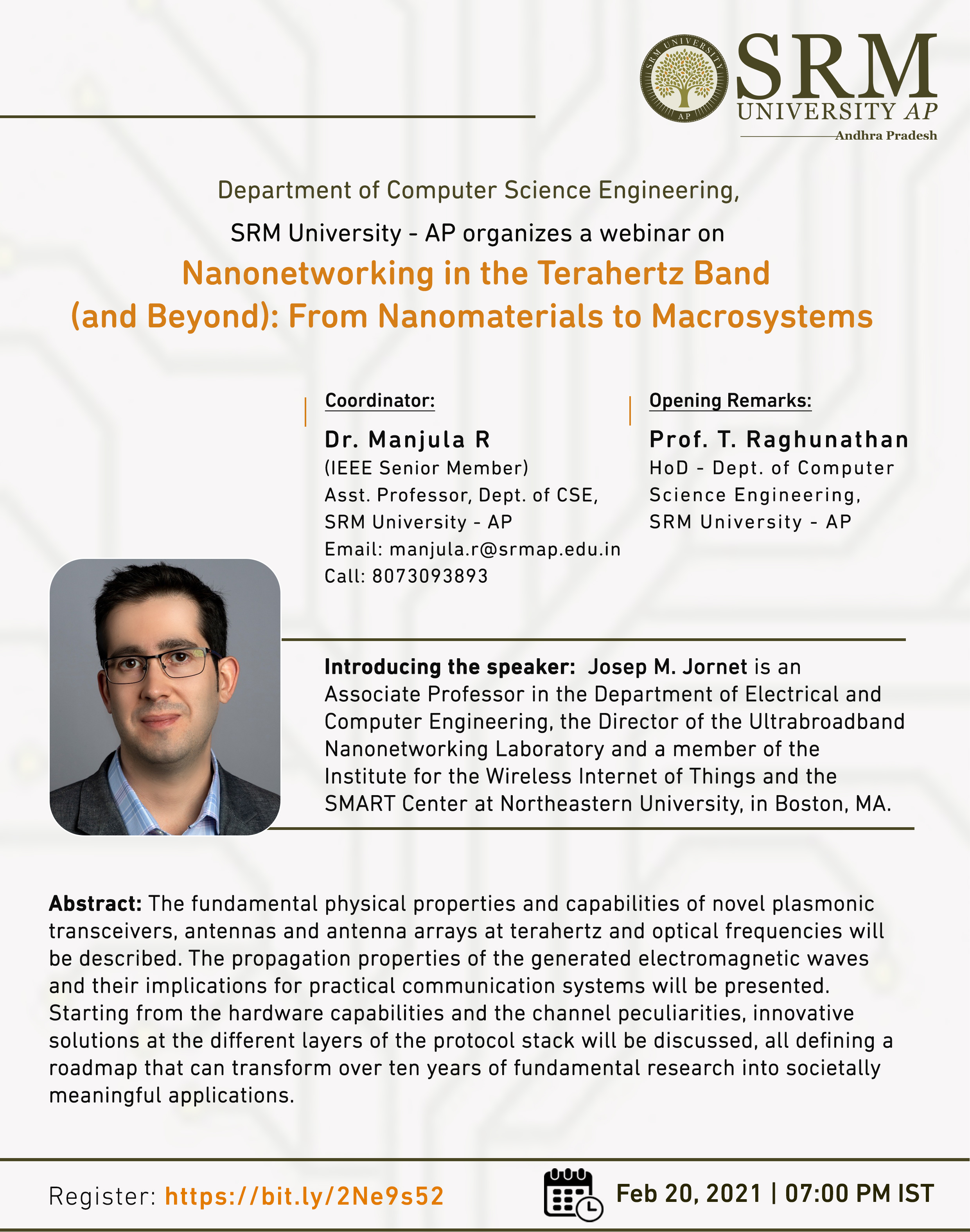 Department of Computer Science and Engineering organises a webinar on “Nanonetworking in the Terahertz Band (and Beyond): From Nanomaterials to Macrosystems” on February 20, 2021, at 7:00 PM IST. Dr Josep M Jornet, Associate Professor, Department of Electrical and Computer Engineering, Northeastern University, USA, is the distinguished speaker for the webinar.
Department of Computer Science and Engineering organises a webinar on “Nanonetworking in the Terahertz Band (and Beyond): From Nanomaterials to Macrosystems” on February 20, 2021, at 7:00 PM IST. Dr Josep M Jornet, Associate Professor, Department of Electrical and Computer Engineering, Northeastern University, USA, is the distinguished speaker for the webinar.
Abstract: The possibility to control matter at the atomic and molecular scale opens the door to new physics, which can be leveraged into developing new types of devices with unprecedented capabilities. For the Communication community, the plasmonic properties of nanomaterials and nanostructures enable the development of miniature transceivers and antennas, which
intrinsically operate in uncharted spectral bands. The extremely small size of the devices and the unprecedentedly large bandwidths that these can excess opens the door to transformative applications across scales. In this talk, the state-of-the-art technology in electromagnetic nano communication and networks will be presented by following a bottom-up approach. The fundamental physical properties and capabilities of novel plasmonic transceivers, antennas and antenna arrays at terahertz and optical frequencies will be described. The propagation properties of the generated electromagnetic waves and their implications for practical communication systems will be presented. Starting from the hardware capabilities and the channel peculiarities, innovative solutions at the different layers of the protocol stack will be discussed, all defining a roadmap that can transform over ten years of fundamental research into meaningful societal applications.
About the Speaker: Dr Josep M. Jornet is an Associate Professor in the Department of Electrical and Computer Engineering, the Director of the Ultrabroadband Nanonetworking Laboratory and a member of the Institute for the Wireless Internet of Things and the SMART Center at Northeastern University, in Boston, USA. He obtained a Bachelor in Science (BS) in Telecommunication Engineering and a Masters (MSc) in Information and Communication Technologies from the Universitat Politecnica de Catalunya, Barcelona, Spain, in 2008. He received his Doctoral Degree in Electrical and Computer Engineering from the Georgia Institute of Technology, Atlanta, GA, in 2013. From August 2013 and August 2019, he was a Faculty at the Department of Electrical Engineering in the University at Buffalo, The State University of New York. His current research interests are in Terahertz-band communication networks, Wireless Nano-bio-communication Networks and the Internet of Nano-Things. In these areas, he has co-authored more than 140 peer-reviewed scientific
publications, one book, and has also been granted 4 US patents, which accumulate over 9,000 citations (h-index of 43) as of February 2021. He is serving as the lead PI on multiple grants from US federal agencies including the National Science Foundation, the Air Force Office of Scientific Research and the Air Force Research Laboratory. He is also the Co-Editor-in-Chief of Elsevier Nano Communication Networks Journal and serves in the Steering Committee of the ACM Conference Series on Nanoscale Computing and Communications. He is a recipient of the National Science
Foundation CAREER award and several other awards from IEEE, ACM and UB. He is a member of the ACM and a senior member of the IEEE.
Join the enlightening session with Dr Josep on February 20 and avail the opportunity to know the latest technology and innovations in the domain of Nanonetworking.
- Published in CSE EVENTS, Departmental Events, Events

